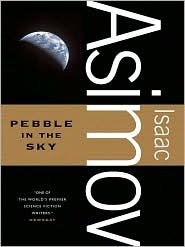Today I'm looking at Pebble in the Sky, by Isaac Asimov, which was his first full-length novel. While works like the Foundation short stories or the robot stories of I, Robot would later be collected in novel form, this was the first book written by Asimov as a full-length novel. That being said, it feels kind of rough around the edges which is a little odd considering I've known Asimov to write good short stories and to write good full-length novels so it may have been just an awkward transition between the mediums for him.
Pebble in the Sky, is actually the third book, chronologically, of the Empire series, set between the Robot stories and the Foundation stories of Asimov's greater literary universe. After doing some digging around I found that the Empire books, opposed to the Foundation or the Robot books, are separated by centuries and while they deal with the rise of the Trantor-dominated Galactic Empire, the three books don't necessarily connect one to the other. I may take a look at The Stars Like Dust and The Currents of Space because they sound like things I might be interested in reading and/or listening to. But I feel like this book is muddled more than anything else.
The biggest problem, I think, is that there are a lot of different plotlines going on at once and since the book isn't all that long in the first place, it feels like none of them get as well developed as they might have been. We begin with Joseph Schwartz, a retired tailor living in Chicago in 1949, out for a morning walk. Suddenly a mysterious atomic energy experiment attacks and flings Schwartz into the distant future where Earth is just one of hundreds of thousands of worlds in the Galactic Empire. Instead of being the capital of this mighty empire, or even revered as the cradle of humanity, Earth is reviled as a provincial backwater, the only inhabited planet polluted with high levels of radiation. Because resources on Earth are so scarce, the population is strictly controlled and once a person reaches sixty years of age they are euthanized, an issue of special concern for Schwartz since he is sixty-two.
If that had been the only plot in the book, a temporal fish-out-of-water situation, I think it might have been better than ''just okay''. Unfortunately Asimov starts cramming in a bunch of other plotlines and while they all end up tying together, it feels very disjointed. We have scientists working on a device that increases the synaptic connections in human beings, making them more intelligent. We have an archaeologist who thinks Earth may be the original home of humanity, opposed to the more commonly held belief that humanity evolved on separate worlds and was able to interbreed with the advent of interstellar flight. And we have a shadowy cloak and dagger conspiracy among the ministers of Earth's home government which ends up taking over the book. I think if Asimov had stuck with one or maybe two of these plots it would have been a lot better, but with four it kind of turns into a jumbled mess.
The only other complaint I could think to make is the book feels very much like it was written in the 1950's with the mores of the time period, but there's not really a lot we can do about that. It's okay, I just think it could have used a bit tighter focus.
- Kalpar


No comments:
Post a Comment